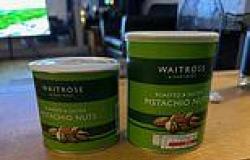Turmeric has fast become ubiquitous. The humble root, which originates in India, is being added to everything from health supplements to juices and beauty products with claims it can help relieve pain, improve brain function and even tackle cancer.
Key to its purported health benefits is its yellow pigment, called curcumin.
This compound may even improve the function of the insulin-producing cells in the pancreas, important for controlling blood sugar levels, as one early study, published in Diabetes Care in 2012, found.
![Medical research tends to use curcumin at very high doses ¿ not just ground-down versions of whole turmeric plants that are commercially available. In fact, eating turmeric ¿ a common ingredient in curries, and more recently added to drinks such as lattes in coffee shops ¿ is a pretty poor way of getting enough curcumin into your body [File photo]](https://i.dailymail.co.uk/1s/2019/06/17/22/14911502-7151579-image-a-1_1560808378668.jpg)
Medical research tends to use curcumin at very high doses — not just ground-down versions of whole turmeric plants that are commercially available. In fact, eating turmeric — a common ingredient in curries, and more recently added to drinks such as lattes in coffee shops — is a pretty poor way of getting enough curcumin into your body [File photo]
People with prediabetes (raised blood sugar levels) were given either a daily curcumin pill or a placebo — nine months later, none of those who took the curcumin pill had developed type 2 diabetes, while nearly a fifth of those given the placebo had the condition.
Another study in 2015 found that patients with the inflammatory bowel disease ulcerative colitis who took a high-dose curcumin supplement with their medication achieved remission after a month.
‘Increasing evidence suggests curcumin reduces the levels of damaging inflammatory proteins released by our cells and therefore has the potential to help many inflammation-based diseases including arthritis, dementia, diabetes, heart disease and cancer,’ says Professor Susan Hewlings, a dietitian at Central Michigan University who co-authored an extensive 2017 scientific review on the spice.
![The humble root, which originates in India, is being added to everything from health supplements to juices and beauty products with claims it can help relieve pain, improve brain function and even tackle cancer [File photo]](https://i.dailymail.co.uk/1s/2019/06/17/22/14911504-7151579-image-a-2_1560808385269.jpg)
The humble root, which originates in India, is being added to everything from health supplements to juices and beauty products with claims it can help relieve pain, improve brain function and even tackle cancer [File photo]
‘For instance, some studies have found taking it as an oral supplement may provide similar pain relief for arthritis sufferers to ibuprofen. However, we must be cautious as curcumin is classified as a food supplement, not a drug, so it hasn’t been through rigorous placebo controlled trials in humans.’
A crucial factor that raises questions about the usefulness of shop-bought turmeric products is the concentration of the active ingredient. Medical research tends to use curcumin at very high doses — not just ground-down versions of whole turmeric plants that are commercially available.
In fact, eating turmeric — a common ingredient in curries, and more recently added to drinks such as lattes in coffee shops — is a pretty poor way of getting enough curcumin into your body.
‘The research on turmeric’s anti-inflammatory effects in the body is very promising,’ says NHS dietitian Dr Sarah Schenker.
![This compound may even improve the function of the insulin-producing cells in the pancreas, important for controlling blood sugar levels, as one early study, published in Diabetes Care in 2012, found [File photo]](https://i.dailymail.co.uk/1s/2019/06/17/22/14911508-7151579-image-a-3_1560808391751.jpg)
This compound may even improve the function of the insulin-producing cells in the pancreas, important for controlling blood sugar levels, as one early study, published in Diabetes Care in 2012, found [File photo]
‘However you would have to drink an awful lot of turmeric lattes to get much benefit and we’re not at the stage where the worried well should be popping a daily pill to prevent illness. But for someone putting up with the daily pain of arthritis, a decent supplement might be worth a try.’
Professor Hewlings adds: ‘I’m a fan of getting nutrients from food in the first instance but in the case of curcumin you would have to eat enormous amounts to get it from your diet.’
That’s because curcumin is not water soluble, so its molecules clump together in the gut, mak-ing them difficult to absorb into the bloodstream.
This means ‘the vast majority of it’ consumed from food won’t be absorbed and passes out as waste, explains Professor Jan Frank, a nutrition scientist at the University of Hohenheim in Germany and a leading expert who has conducted trials into curcumin and the most effective way to take it.
To overcome this and maximise the potential health benefits, he says some manufacturers have developed ways to increase curcumin’s ‘bioavailability’, i.e. how much is absorbed by the body.
Some have added emulsifiers to help mix the ingredients properly and make the curcumin water soluble and so better absorbed. Other popular methods to try to improve absorption include adding a source of fat or some piperine (a compound found in black pepper) to the food supplement.
So how useful are commercially available turmeric products? Above, Professor Frank analyses a selection. We then rated them:
Pukka Tumeric Gold Tea (1/10)
20 tea bags, £2.99, most supermarkets.
Claim: These turmeric teabags also contain green tea, liquorice, cardamom and lemon. The bags must be steeped in boiling water for up to 15 minutes.
Expert verdict: This beverage may well be refreshing and taste good, but you’re not going to get enough of the important ingredient curcumin to have a significant anti-inflammatory effect in the body.
The maker claims that each bag contains 40 per cent turmeric root but — as curcumin isn’t water soluble — you’re not going to absorb any meaningful amounts







